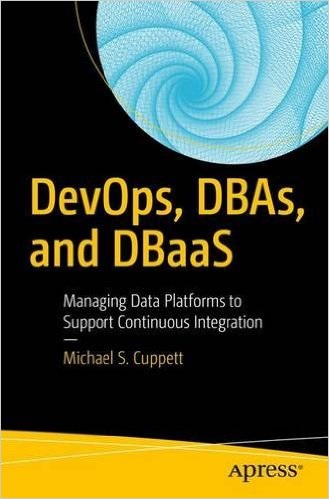Postman announced Agent Mode, an AI-native assistant that delivers real productivity gains across the entire API lifecycle.
Although DBAs fortunately have the rare ability to bridge the gap between development and operations, they have been detrimentally overlooked in many companies that deploy DevOps practices. A DBA's ability to interrogate code and construct a resilient, well–performing database environment uniquely defines the capabilities needed for DevOps.
DevOps requires transformation from organizational silos defined by a technology skill set to process-driven, continuous flowing work streams that are empowered by collaboration and automation. DevOps is about speed, delivery time, continuous integration and deployment, release cadence, and superior customer experience. Although metrics are critical for measuring customer experiences such as application responsiveness, they are also needed to measure release success rate, software defects, test data problems, work, and more.
DBAs tend to be strong technical leaders who provide insight into coding best practices, host platform configurations, database performance improvements, data security and protection. To be successful, DBAs have to communicate, collaborate, teach, and learn while continuously improving database performance and availability. The job often includes having to meet with development to discuss poor performing code, index requirements, or execution plans to recommend code remediation. These "normal" interactions are imperative to the success of DevOps, leaving me perplexed about why DBAs were not one of the first operations team members asked to join the DevOps movement.
Transition
Understanding that DBAs are "built" in significantly different ways should help with the approach. Many DBAs were once developers, others came from various infrastructure roles, and still others have always been DBAs. Determining which DBA type is easier to bring into the fold is a fool's game. DBAs are people, and people are surprisingly unpredictable. One ex-developer DBA may be excited to finally be able to use both skill sets to help advance DevOps, whereas another may be perturbed by having to dig up old skills she had hoped were long dead and buried.
Individually interviewing and evaluating each DBA may be necessary. Much like interviewing potential employees, discernment is needed to assess fit, training needs, and potential disruptive factors that may impact the existing DevOps team members. The right leaders and SMEs need to be involved and dedicated to the time and effort needed to integrate DBAs. Rest easy; the good news is that even if some DBAs may resist, they all want to provide value by improving the environment.
Besides, as you start to expand participation in DevOps, you already have a handful of people in mind to make the voyage smoother. You know who I'm talking about. Yes, the ones you see talking to the development teams on a regular basis, checking in to see how things are going, seeing what changes are coming down the pipe, asking what the application users are saying about performance, and even offering to assist as needed. These people should be your initial picks to join the DevOps team. Specifically, you should find DBAs who are already engaged, bring them on board, and then let them help you select and onboard other DBAs when needed.
Having a trusted and respected DBA doing the team's bidding for additional DBA talent is likely to result in volunteers. People want to work with people with whom they have an established relationship. Leverage previous successful working relationships to resourcefully construct the DevOps team.
This blog is an excerpt from Mike Cuppet's book: DevOps, DBAs, and DBaaS(link is external)
Read DBA: Bridging the Gap Between Development and Operations - Part 2
Industry News
Progress Software announced the Q2 2025 release of Progress® Telerik® and Progress® Kendo UI®, the .NET and JavaScript UI libraries for modern application development.
Voltage Park announced the launch of its managed Kubernetes service.
Cobalt announced a set of powerful product enhancements within the Cobalt Offensive Security Platform aimed at helping customers scale security testing with greater clarity, automation, and control.
LambdaTest announced its partnership with Assembla, a cloud-based platform for version control and project management.
Salt Security unveiled Salt Illuminate, a platform that redefines how organizations adopt API security.
Workday announced a new unified, AI developer toolset to bring the power of Workday Illuminate directly into the hands of customer and partner developers, enabling them to easily customize and connect AI apps and agents on the Workday platform.
Pegasystems introduced Pega Agentic Process Fabric™, a service that orchestrates all AI agents and systems across an open agentic network for more reliable and accurate automation.
Fivetran announced that its Connector SDK now supports custom connectors for any data source.
Copado announced that Copado Robotic Testing is available in AWS Marketplace, a digital catalog with thousands of software listings from independent software vendors that make it easy to find, test, buy, and deploy software that runs on Amazon Web Services (AWS).
Check Point® Software Technologies Ltd.(link is external) announced major advancements to its family of Quantum Force Security Gateways(link is external).
Sauce Labs announced the general availability of iOS 18 testing on its Virtual Device Cloud (VDC).
Infragistics announced the launch of Infragistics Ultimate 25.1, the company's flagship UX and UI product.
CIQ announced the creation of its Open Source Program Office (OSPO).
Check Point® Software Technologies Ltd.(link is external) announced the launch of its next generation Quantum(link is external) Smart-1 Management Appliances, delivering 2X increase in managed gateways and up to 70% higher log rate, with AI-powered security tools designed to meet the demands of hybrid enterprises.













